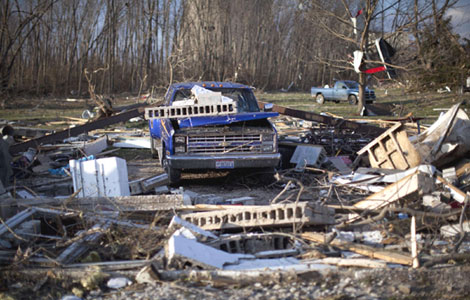 |
|
|
|
|||||||||||
Sisters-in-law are coming out for a visit. The usual "must-do" suspects, the Great Wall, Tian'anmen Square, hutong, have been ticked off. What else, I asked them tentatively in an e-mail. In a country soaked in history, it was a modern-day wonder they wanted to experience: The Beijing-Shanghai train.
I could see their point. In December I had taken my first high-speed journey, not to shiny Shanghai but to harsh Harbin, more than 1,000 km north of Beijing.
Harsh? It was minus 15 C at Harbin station when I arrived, colder outside as the unforgiving wind gnawed at exposed skin. A nine-hour night journey, in a four-berth cabin.
Why Harbin? A teacher of mine in the Irish city of Limerick in 1969 showed us a map of China. Miss Quinn wanted to share her fascination for the country with her young pupils. Randomly, she pointed to Harbin and said that if any of us visited there, it would show that the world had changed.
It is changing. With 3,500 km of high-speed railways expected to be put into use this year, domestic high-speed rail will exceed 10,000 km. This is more than the rest of the world combined. There will be four major arteries. One of them, the Beijing-Shanghai line, opened in June. The others will connect Beijing and Guangzhou, Beijing and Harbin, and cities on the southeast coast with high-speed railways.
The arteries will significantly cut travel time between major urban areas.
Train travel from Beijing to Shenzhen will take eight hours instead of the current 24 and trips from Beijing to Harbin will take only five hours instead of nine.
The scale of the high-speed project is far grander, both in engineering terms and social connectivity, than it has been given credit for internationally. Potentially hundreds of millions of people will benefit as it expands.
And this goes beyond borders. China is also planning a high-speed link with its neighbors and a regional network seems to be evolving.
But there have been bleak days. In July a crash claimed 40 lives and the issue of safety was raised.
Purchasing tickets can be time-consuming, either online or at a station. The main stations are functional but the services they provide belong to an era when words like "Net" and "Web" meant something completely different to what they mean today.
I had bought my ticket two days before departure and as I entered the ornate surrounds of Beijing Railway Station, a smartly dressed attendant pointed out the waiting room for the Harbin train. The wind howled outside the station's rafters. I was humming Lara's Theme from Dr Zhivago. Now it was time for me to go. Directed to the platform, my ticket inspected, I boarded the long white tube. Shortly before the 9 pm departure I was in the four-bed compartment, introducing myself.
My basic Chinese managed to cover the fact that I was Irish and lived in Beijing with my family. Nods were exchanged. The train eased out of the station. My traveling companions were soon lulled not by the traditional clickety-clack of wheels on track, but the whoosh, whoosh of 21st-century travel.
Outside a raw, bitter, night shrouded a rural landscape little changed for centuries. My sleeping companions were blissfully unaware that Mother Nature's cold hands were clawing at the train's high-tech fabric.
After a brief sleep, I woke. Dawn breaking in northern China, the winter sun hesitatingly, even apologetically, making a blushful appearance. Pulling into Harbin Station I could see people already on the city's streets huddled against the wind, exhaling vapor trails from breathing even though scarves covered their mouths. Into the station, 6 am, exactly on time. Bleary eyed, we bid each other zaijian. I had no hotel booked, did not know the city, but Lara's Theme was still playing in my mind. Outside the station, Harbin and its fascinating history beckoned. Miss Quinn was right: The world had changed.
The author is a senior editor with China Daily.
Wu Ying, iPad, Jeremy Lin, Valentine's Day, Real Name, Whitney Houston, Syria,Iranian issue, Sanyan tourism, Giving birth in Hong Kong, Cadmium spill, housing policy

|

|

|

|

|

|